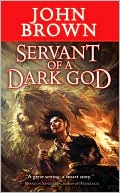Conditions for Suspense:
Part 6–Character deservingness
by John D. Brown
 The following is part of a continuing series. If you wish to start at the beginning, head to It’s All About The Reader.
The following is part of a continuing series. If you wish to start at the beginning, head to It’s All About The Reader.
In my last post, I discussed the idea that there are three factors that invest readers in your characters. The first factor was trouble. But trouble isn’t enough. We will only root for someone who is deserving.
All of us have an automatic scale of justice inside of us. We can’t turn it off. Nor can we ignore it. It’s very simple. If someone’s bad outweighs their good, then we think they don’t deserve good things. Conversely, if someone’s good outweighs their bad, we think they should be happy.
Don’t believe me? Fine, let’s test it.
A boy breaks his arm and he whines, whines, whines about it all day long. Tells his teachers he can’t do his school work because of it. Mopes at home in front of the TV. Steals his sister’s money to buy candy because he has this awful injury and he deserves it. Maybe he makes all his friends listen to him talk about how hard it is, and he just goes on and on and on.
You know exactly what you’re thinking. You know exactly how much sympathy you have for him, which is none.
Another boy has a broken arm. But this one doesn’t whine. In fact, when his dad falls ill, he goes out and with the one good arm, and in pain, mucks out the horse stalls. He does this because his dad was going to lose his job if he didn’t. Then the boy comes back in and cleans himself up and doesn’t say a thing.
You like that second boy? You want good things for him?
Of course, you do.
Problems aren’t enough. They’re only half the equation. For us to root for someone, we have to feel they’re deserving. Or if you like the term better, you can say they need to be “likeable.”
So what makes someone deserving or likeable?
That’s going to be slightly different for each person because our moral codes are all slightly different. If you feel it’s a sin to kill animals, you might feel conflicted reading a story about a rancher who needs to get his cattle to slaughter. If you feel unions do nothing but harm, you might throw down a book that’s about a union boss trying to force a corporation into compliance. Nevertheless, there are many virtues and vices that people hold in common. Usually, we feel people are deserving if they weigh more on the one side of the table below than they do the other.
| Deserving / Likeable | Not Deserving / Unlikeable |
|
|
We tend to like people more who show the characteristics on the left side. We tend to dislike people who show the characteristics on the right side.
Notice, a lot of this has to do with motive. In many instances it isn’t just the act that decides us for or against someone. It’s the act + the reason why they did it. Let’s go back to that example of the kid with the broken arm that mucked out the horse stall. We’ll love him if he made that sacrifice out of selflessness. We’ll feel something different if he does it only because it allows him to hide his and his father’s crime (maybe they killed someone and have temporarily stashed the body in the barn under the muck in a stall).
Furthermore, while we need to make the characters we want our readers to root for deserving, this doesn’t mean they have to be paragons of virtue. Remember that deservingness is weighed on a scale. Just as long as the characters tip the scales one way, we will feel they’re deserving. On the other hand, if they cross the line the other way, we’ll turn against them.
For example, let’s say your lead character is a thief who steals money from retired folks. But in your story she’s trying to save a kid from being kidnapped and sold into the sex slave trade. Yeah, our character may be a thief, but what she’s doing outweighs the bad, and we’re going to root for her.
Now let’s make our lead a child molester. He’s trying to capture a brutal drug cartel murderer who has just escaped prison. Along the way he has his way with a few children.
Who are you rooting for this time?
Yeah, me too. I hope the murderer finds the child molester and offs him. Or at least alerts the authorities to his crime and ties him up in a neat package for them to pick up.
So you don’t have to have perfect people as your leads. In fact, it’s sometimes more interesting to have someone with foibles just like the rest of us. But when those foibles turn into things we find despicable, we’ll turn against those characters.
And vice versa. For those of you who have read or watched Pride & Prejudice, did you notice how you rooted against Mr. Darcy when we interpreted his actions as smug condescension? The moment he changed, and we learned of it, we cheered for him. It was all a matter of deservingness.
If we want to hope and fear for our characters, they need troubles. But they also need to weigh in on the deserving side of our scale of justice. When they do, they become admirable, likeable, heroic.
In fact, heroes, the ones that make us stand up and cheer, are those people that put their own happiness at risk to do the “right” thing. They’re the very embodiment of deservingness.
So make your characters admirable in some way, if only just a little bit.
For more on the topic of deservingness, read How Inequity and Deservingness Propel Readers Through Story.
Still, we’re not done yet. We might have characters who are completely deserving, but they are so boring we can’t muster any interest in them. And that brings us to the third Pareto factor.
—
 John Brown is an award-winning novelist and short story writer. Servant of a Dark God, the first book in his epic fantasy series, was published by Tor Books and is now out in paperback. Forthcoming novels in the series include Curse of a Dark God and Dark God’s Glory. He currently lives with his wife and four daughters in the hinterlands of Utah where one encounters much fresh air, many good-hearted ranchers, and an occasional wolf.
John Brown is an award-winning novelist and short story writer. Servant of a Dark God, the first book in his epic fantasy series, was published by Tor Books and is now out in paperback. Forthcoming novels in the series include Curse of a Dark God and Dark God’s Glory. He currently lives with his wife and four daughters in the hinterlands of Utah where one encounters much fresh air, many good-hearted ranchers, and an occasional wolf.
For a list of all of the posts in this series thus far, click on the “John D. Brown” tag.


